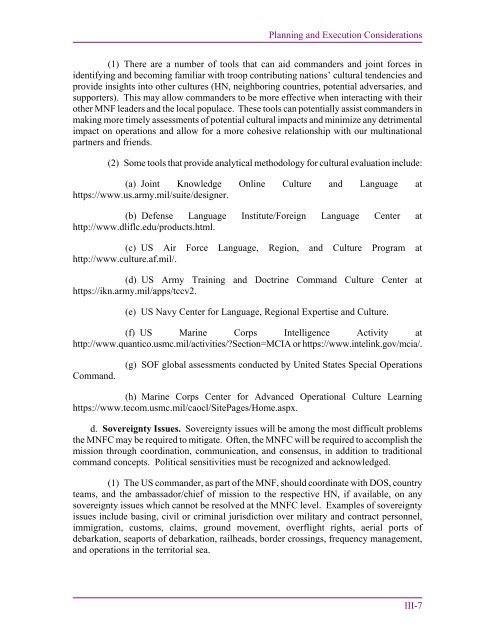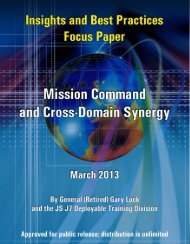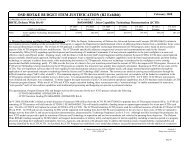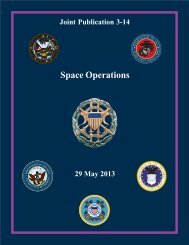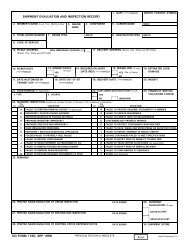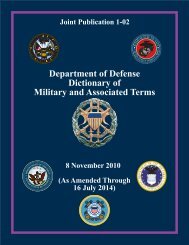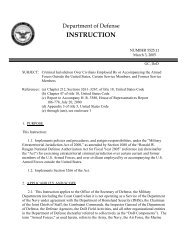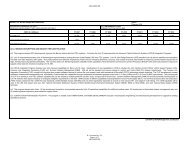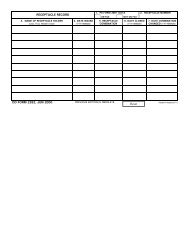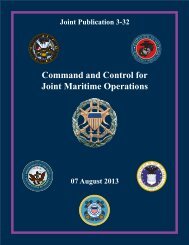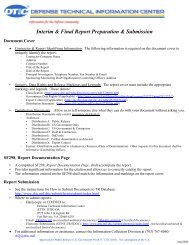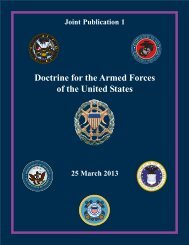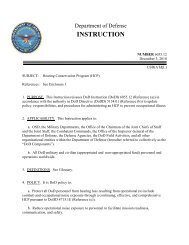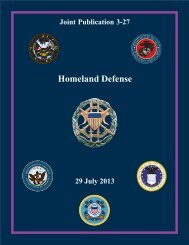JP 3-16, Multinational Operations - Defense Technical Information ...
JP 3-16, Multinational Operations - Defense Technical Information ...
JP 3-16, Multinational Operations - Defense Technical Information ...
You also want an ePaper? Increase the reach of your titles
YUMPU automatically turns print PDFs into web optimized ePapers that Google loves.
Planning and Execution Considerations<br />
(1) There are a number of tools that can aid commanders and joint forces in<br />
identifying and becoming familiar with troop contributing nations’ cultural tendencies and<br />
provide insights into other cultures (HN, neighboring countries, potential adversaries, and<br />
supporters). This may allow commanders to be more effective when interacting with their<br />
other MNF leaders and the local populace. These tools can potentially assist commanders in<br />
making more timely assessments of potential cultural impacts and minimize any detrimental<br />
impact on operations and allow for a more cohesive relationship with our multinational<br />
partners and friends.<br />
(2) Some tools that provide analytical methodology for cultural evaluation include:<br />
(a) Joint Knowledge Online Culture and Language at<br />
https://www.us.army.mil/suite/designer.<br />
(b) <strong>Defense</strong> Language Institute/Foreign Language Center at<br />
http://www.dliflc.edu/products.html.<br />
(c) US Air Force Language, Region, and Culture Program at<br />
http://www.culture.af.mil/.<br />
(d) US Army Training and Doctrine Command Culture Center at<br />
https://ikn.army.mil/apps/tccv2.<br />
(e) US Navy Center for Language, Regional Expertise and Culture.<br />
(f) US Marine Corps Intelligence Activity at<br />
http://www.quantico.usmc.mil/activities/?Section=MCIA or https://www.intelink.gov/mcia/.<br />
Command.<br />
(g) SOF global assessments conducted by United States Special <strong>Operations</strong><br />
(h) Marine Corps Center for Advanced Operational Culture Learning<br />
https://www.tecom.usmc.mil/caocl/SitePages/Home.aspx.<br />
d. Sovereignty Issues. Sovereignty issues will be among the most difficult problems<br />
the MNFC may be required to mitigate. Often, the MNFC will be required to accomplish the<br />
mission through coordination, communication, and consensus, in addition to traditional<br />
command concepts. Political sensitivities must be recognized and acknowledged.<br />
(1) The US commander, as part of the MNF, should coordinate with DOS, country<br />
teams, and the ambassador/chief of mission to the respective HN, if available, on any<br />
sovereignty issues which cannot be resolved at the MNFC level. Examples of sovereignty<br />
issues include basing, civil or criminal jurisdiction over military and contract personnel,<br />
immigration, customs, claims, ground movement, overflight rights, aerial ports of<br />
debarkation, seaports of debarkation, railheads, border crossings, frequency management,<br />
and operations in the territorial sea.<br />
III-7


